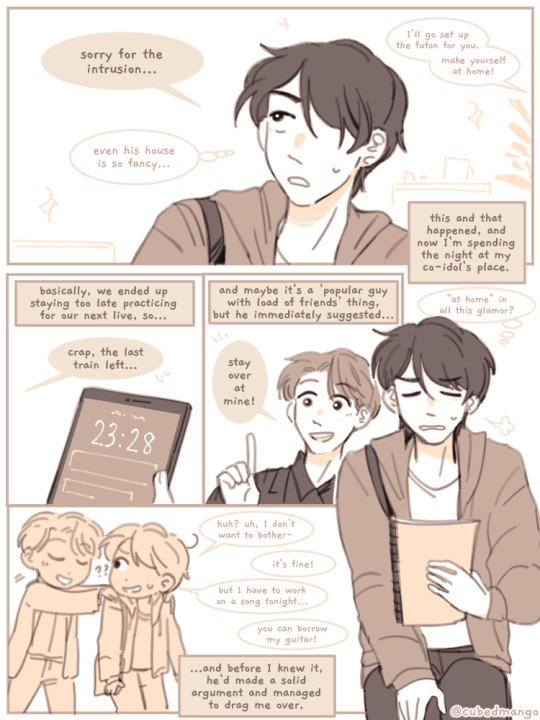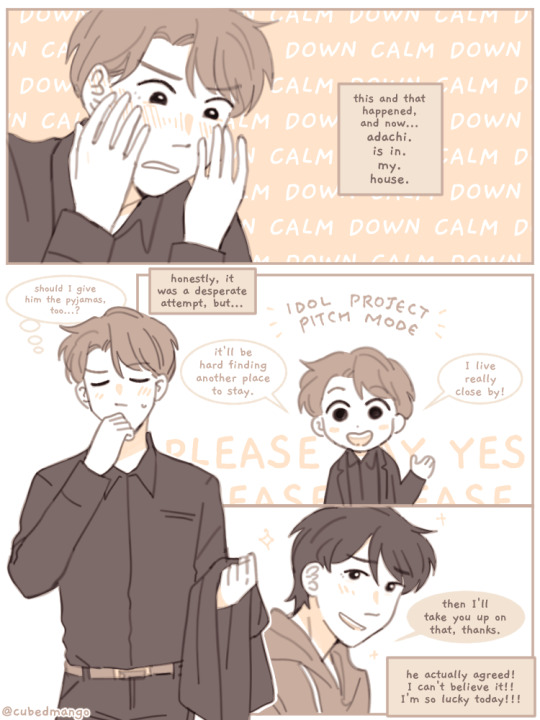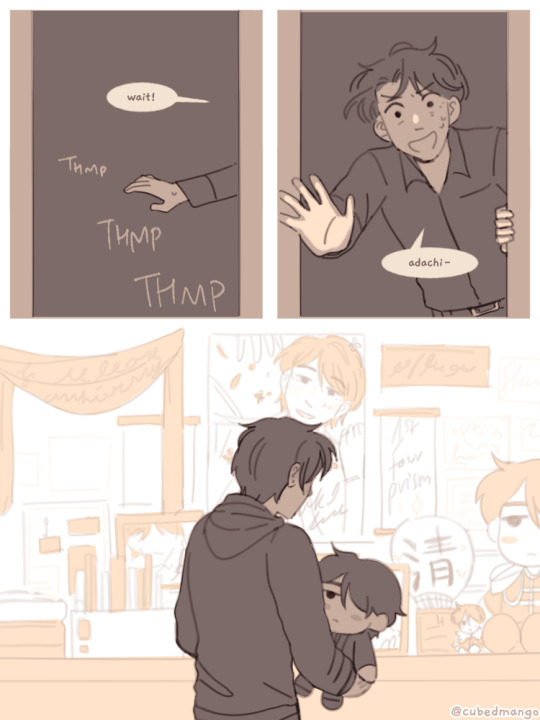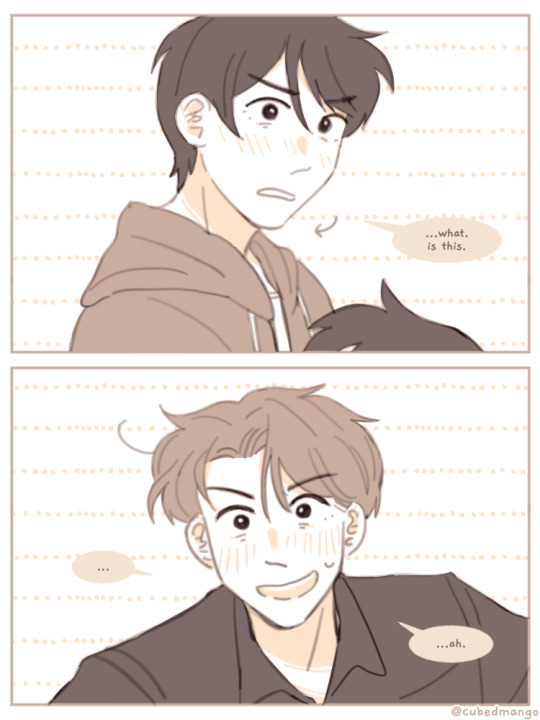#i was thinking 'ok so how does adachi find out here' and my brain provided the funniest idea jkdfjdjg
Text


a true fan's collection
(rest of the pages below)




#cherry magic#my art#comic#please enjoy the worlds stupidest comic#got the idea for this basically the second i read the idol au booklet but it took a while to. execute#i was thinking 'ok so how does adachi find out here' and my brain provided the funniest idea jkdfjdjg#got to see some of senseis old art for the au again as refs and man i do hope she picks it up again eventually i wanna see more
126 notes
·
View notes
Text
Be Brave Adachi, or the musical shaping of episodes 1-4
Part 4: Episode 4
This is part of a 4 part series. You may wish to start with part 1, where I introduced the main musical cue we’ll be following and how it represents Adachi questioning the world as he knew it. Or, if you missed part 2, or part 3, you might want to start there.
If you would like to follow along, please cue up 13:15 in episode 4.*
HOO BOY does everything happen in Episode 4! I swear every time I went back to rewatch to check something I noticed 2 more things that were worth mentioning. Go get your drink of choice, we’re gonna be here a while.
Since we have so much to talk about, and there’s not much new going on, I’m going to gloss over the 1.5 rotations of Questioning that happen right after Adachi gets off the phone with Tsuge. Y’all probably recognize it by now, right? Right.
The really interesting new stuff in this episode starts after Kurosawa rescues Adachi and Fujisaki, while they’re walking back to the office. Here, for the first time in full since episode 1, we get a repeat of the guitar music that I called Adachi-at-home in the first post in this series. Now, I’m gonna have to make a slight retraction because a) I didn’t know yet that this was gonna be important later, and b) it’s more interesting than I originally thought. So, to add some nuance, this guitar cue is not just Adachi when he’s on his own, fully relaxed, it’s that plus Adachi ruminating on how he doesn’t compare to Kurosawa. In the first case, he’s wishing for just one of Kurosawa’s good qualities. Here, he’s pointing out that they are “fundamentally different” with overtones of I am fundamentally worse than he is. The super interesting thing that I missed the first time around though is that this is the tune of the Home section. Sure it’s in C-sharp major (ish) rather than A major (not exactly a related key, but not an unrelated key either, at least if you ask Brahms^), but the melody is the same enough that I DEFINITELY should have caught that. What can I say, *shrug* pandemic brain.
So, anyways, given what I have since discovered about this guitar cue, I’d like to revise what I think it’s about - it’s about Adachi’s unacknowledged crush on Kurosawa. He still doesn’t realize yet that Kurosawa is something he wants, but moments like these show us just how much he wants it.
Around 16:15, at the end of Fujisaki’s internal monologue in the elevator, Questioning comes in. This time, though, it’s not about Kurosawa in the slightest. When I was first trying to come up with a point to this series so my Intro to Musicology professor wouldn’t hunt me down for writing a “here’s some stuff” paper, I was all ready to say Kurosawa is the answer and call it a day. But if that’s the case, then why does Questioning start here? Sure, he just found out that Fujisaki knows about Kurosawa’s crush, but the worldview that he’s questioning isn’t that Fujisaki is more observant than he thought. It’s his reaction to her disinterest in relationships. Furthermore, this version of Questioning is far more stable than previous ones - instead of a tritone or other non-chord set of vertically stacked pitches, most of the Question phrases end on unison D, or some version of D + F-sharp (usually in the m6 orientation, rather than M3). Each Question phrase is approximately in time, or at least close enough that we have a sense of when the next will happen, where in the first few versions of Questioning the space between each phrase rotation felt indeterminate. I think what we’re seeing here is that even though Adachi still has questions, his life has already changed. He has a better sense of the people around him, and is less terrified of asking questions.
The Questioning section actually pauses when Kurosawa notices Adachi’s wound, and we don’t head into the next section immediately. In fact, we don’t ever get the next section here - we jump straight to Home, as Adachi starts back in on how much better Kurosawa is than him. It’s in the piano here, I think mostly so that they don’t have to change instrumentation midway through (we’ll see why in a second). This version of Home is the same slow tempo as the guitar version, and it’s very dry. All of the harmony is in block chords, which contributes to a kind of emptiness. But that’s ok because it doesn’t last.
After a single (musical) sentence, Adachi begins to hear Kurosawa’s own self-loathing through his thoughts. As this happens, the chords that were once in blocks stretch out into arpeggios, filling in the spaces around the melody, in a move that reminds me so much of the way that letting go of a bit of anxiety can feel like unfurling from a tiny space.** Kurosawa’s “I’m sure he finds me annoying” is immediately followed by the addition of a cello line - and I’m about to go do some rewatching looking for where cello is important, but my first impression hypothesis is that cello represents Kurosawa’s inner headspace, particularly after some of the ways I noticed it being used in ep. 7. The cello twines around the piano line that we’re already familiar with, possibly as a metaphor for the way that Adachi and Kurosawa are having similar thoughts. And, as with earlier episodes, we end without a full resolution - we get a cadence, sort of, but the piano continues for a bit and ends with a cluster of notes with G as the main thing that catches our ear. For those unfamiliar, G is not a particularly tonic-feeling note in A major. It’s flat 7, which helps tremendously in feeling like we are NOT in major, better suited to the melancholy nature of the various thoughts flying around here.
And then. Ok, and THEN. The part I have been writing this entire series to talk about. So, to set the scene, right? Adachi thanks Kurosawa, Kurosawa deflects but gives Adachi a direct, blinding smile, and for once Adachi doesn’t squint. He returns the smile. He has become comfortable here.
As if that weren’t enough, the music comes in, and yes, we’re back to Questioning, but it is absolutely in time, with two beats of 6/8 between each iteration of the Question Phrase. Furthermore, this version has both guitar and glockenspiel in it - the guitar is Adachi’s home instrument, and here it suggests he’s become comfortable with questioning the world around him, while the glock does more to highlight the difference in the treatment of time.
We don’t move on from this section for a bit, because Fujisaki interrupts his thoughts. We do, however, get hints of the next section - a rising line in the piano timed in the same way as the next section will start, for example. The underpinnings of the Questioning section provide a lush background for Adachi’s monologue on visiting Fujisaki’s mother, something the first version of Questioning could not have done. Adachi is being very brave here, and the changes to our favorite cue are a reflection of that.
As he finishes we head in to the section of the piece, which is mostly accompanying shots of Fujisaki being overwhelmed, Adachi being worried that his attempt to be brave has gone wrong, and not much happening. There’s a weird loop in the middle, which makes me think that they tried it with the whole track and it felt waaaay too long without anything happening.
Anyway, after she reassures him that his bravery is appreciated, we head into the Answer section. Adachi and Fujisaki’s chitchat isn’t what’s important here. The important thing is we have the Answer section, and here it is fully scored, electric guitar and bass, percussion, the works. Not only that, but the cue ends, and it ENDS ON THE TONIC. We did it folks! We found the resolution! And it turns out, the way to get there was to BE BRAVE.
This may not be the end of the whole series, but this is AN ending. This is the pan-out that we get at the end of every 90s Hollywood teen romcom. Adachi has Learned Something with capital letters, and it’s not that he loves Kurosawa or even that he needs to give up his low self-esteem. It’s that he can be brave, and he can contribute. It’s hard, and it may take four episodes of building to it, but he can do it.
Which is a lesson he’s really gonna need for the beginning of 5. But that’s a story for another time.
If you’ve followed my nerdery this far and you’ve enjoyed this series, please let me know via likes, replies, and/or reblogs. I may eventually continue the series if there’s enough interest (there’s some FASCINATING things that happen to this cue in episode 7, for example), but for now, I’m gonna go take a nap.
I did a follow up in response to an ask, if you really really want more.
*All video timings and quotes are from Irozuku Subs videos. If you’re watching somewhere else, your mileage may vary slightly.
^If you’re a SUPER HARD CORE theory nerd, look up Neo-Riemannian Theory for how this works. Or just if you want your brain to explode. Either way, have fun, cause I need it for my dissertation and I STILL don’t quite understand how it works.
**Not an Academically Approved metaphor. This is why I’m doing this on tumblr.
#cherry magic#cherry magic! thirty years of virginity can make you a wizard?!#adachi kiyoshi#music meta#For anyone who's actually read ALL OF THIS#thank you very seriously from the bottom of my heart#in case you were curious the google doc ended up 8 pages long#it would probably be more if I felt up for editing more#anyway really seriously thanks for putting up with my weirdo music theory nerd vibes CM fandom#I appreciate it
23 notes
·
View notes